When one reads the literature on shame one finds a bit of confusion as to what shame is and is not. Or perhaps it is better to say that people have differing views on it. One commonly finds three things mentioned in relation to shame.
Internalised anger
Guilt &
Shame
These three things are often mentioned as relating to or being part of shame. My own view is that each of these constitute three separate psychological processes. They are three separate entities. However they can and often do occur contemporaneously.

This would explain why some people may see guilt as being part of the shame experience or internal anger as defined as being shame on occasion. They can occur at the same time and often do. If one can define the three separate psychological processes this would clarify the nature of shame and its associated processes.
There are two ways in which internal anger can occur as shown in the diagram
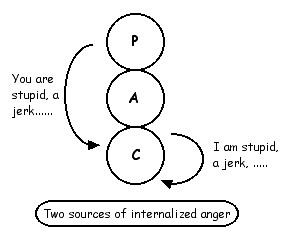
People can express anger at themselves from their Child ego state. When this occurs people will do negative internal self talk such as I am stupid, I was a geek talking to that girl and so on....
Anger can also be expressed from the Critical Parent ego state to the Child of the person. In this case the internal self talk does not start with a “I” statement but with a “You” statement when an internal ‘telling off’ occurs. Examples may be “You were such a jerk talking to that boy”, “You can’t even get a simple report right”, You stupid f**k” and so forth.
Guilt occurs when the person has a sense of breaking an internal rule which they have for them self. If a husband thinks the woman next door is hot and foxy but he has a rule inside his Parent ego state which says, “Thou shalt not covet thy neighbours wife” then he can end up feeling guilt for having such thoughts and feelings.

Or a person may steal money from a brother and later feel guilt about it because he has the rule in his Parent that you don’t steal from your brother. People can feel guilty the next day after a night of drinking too much. Alcohol decommissions the Parent ego state and thus people behave in such ways that they usually wouldn’t. The next day after the alcohol has worn off they feel guilty because the Parent ego state becomes active again.
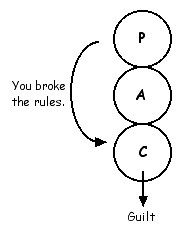
Finally we have shame which is a natural feeling reaction to a particular environmental stimuli. Often, but by no means always, it is associated with sex, nudity or intimate bodily processes such as urinating or defecating. A prime example is the enuretic child who wets his bed at night. When the child wakes up and realises he has wet the bed it is very easy for him to feel shame about that and he can go to extensive lengths to try and hide it. Indeed parents need to be very careful not engender a sense of shame in a child when he wets the bed. It needs to be dealt with very carefully so as to avoid this. Thus we have the shame transaction.
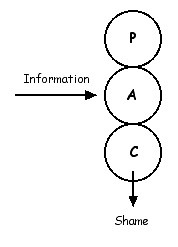
As you can see this differs from the guilt transaction in that there is no Parent to Child transaction before for emotion is experienced. This is consistent with Freud’s presentations on shame which is probably best summed up by Lynd(1958) who notes that guilt is usually more related to transgressions of clear moral codes and rules. No better example of this is found in religious texts which define what behaviours, thoughts and feelings are regarded as sinful. These are incorporated into the Parent ego state by the young child and when transgressed the individual most often will expoerience guilt.
With shame the rules are much less codified and clear. Transgressions of them are more by tactlessness, errors in taste or bad luck. As a result the Parent ego state is much less involved in the process. Again the example of the enuretic child demonstrates this. Wetting the bed does not break a Parent ego state rule and generally would not be regarded as sinful. Instead it result from bad luck or factors outside the child’s control.
Lynd, H.M. (1958) On Shame and the Search for Identity. London: Routledge & Kegan Paul.
This indicates that there are three separate psychological processes - inward anger, guilt and shame. They can occur on their own or they can occur together. However if we see them as separate processes then the situation as to what shame is and is not can be kept more clear.
The separateness of these three psychological processes can be understood experientially as well. In therapy I may ask the client the following questions:
Recall a time when you felt guilty.
What happened and describe the feeling? Use a few words to describe what the experience of guilt feels like for you?
Recall a time when you felt shame.
What happened and describe the feeling? Use a few words to describe what the experience of shame feels like for you?
Recall a time when you felt angry at yourself.
What happened and describe the feeling? Use a few words to describe what the experience of self directed anger feels like for you?
Most people find this quite easy to do and report that the experience of shame and guilt are different which supports the contention that they involve discrete psychological operations.
If any one here wants to do this exercise I would be interested to hear your answers.

Shame and embarrassment
Under normal circumstances shame is not an emotion that is experienced all that often. The feelings chart shows there are various groups of feelings.

I have purposely used the word “Family” because they are like that. There is a commonality amongst the feelings but they are also all different. Just like members in a family, they all have a basic commonality and they are also all different.
It is proposed that shame and embarrassment are like this. Embarrassment is a minor version of the full shame reaction and thus embarrassment is a much more common feeling for people to experience. It is safe to say that most people could relatively easily recite situations where they have felt embarrassed. Under normal circumstances there would be far less events to recall where the person felt shame.
They both come from the same emotion but vary in their impact. Whilst embarrassment is an unpleasant emotion to experience it does not have the devastating effect that shame can have. Charles Rycroft notes that shame is the cinderella of the destructive emotions. The experience of shame tears at the core of who we are. It effects us at a deep level and the understanding of who we are.

With guilt people can have the experience of,
“I am bad for doing that thing”
whereas with shame the person is more likely to end up with the feeling of,
“I am bad”
Whilst the shame will be connected to a certain event occurring the resultant comprehension of it is more about me as a person rather than about something I have done. Shame has far more destructive power than most other emotions.
As stated above under normal circumstances shame is infrequently experienced. It tends to only be experienced in relation to quite unusual circumstances, where as embarrassment is more frequently experienced in reaction to a wider range of events. There is however an exception to this.
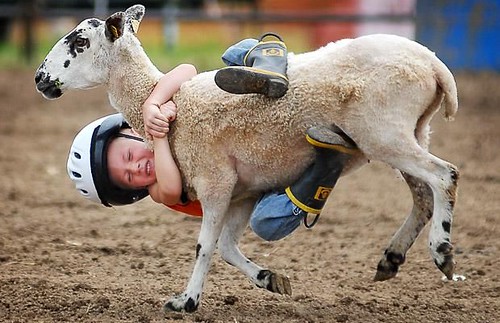
Will he feel embarrassed about ending up like this? Lots of people are watching!
Parents quickly learn that emotions are a effective way to get children to conform.
They can use guilt.
“Mummy will feel sad and hurt if you don’t eat up all your food”.
They can use fear by threatening abandonment.
“Unless you have your bath now mummy will get a policeman to come and take you away”.
These emotions cause pain in the child and thus the child will tend to behave in order to avoid the painful experience. The same applies for shame which can be a very unpleasant emotion to experience. Thus parents can say things like,
“You should be ashamed of yourself for.....”
It works in getting a child to behave in a certain way but it is also particularly destructive in the ways described above. I would strongly advise parents not to employ this kind of child rearing practice.
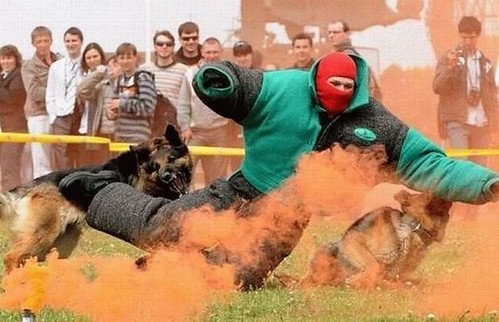
This will get people to conform, but at what long term psychological cost?
If you are working with a client who reports this kind of parenting in their childhood then you know the person may be damaged psychologically at quite a deep level. Also they will tend to report the experience of shame in the present more than average. They will tend to react to events with shame whereas others would tend to only experience embarrassment. This of course just amplifies the problem.
Rycroft, C.
1971. Reich. Fontana: Great Britain
The discussion about using shame as a parenting technique provides insight into the difference between neurotic shame and Here and Now (H&N) or reality based shame.
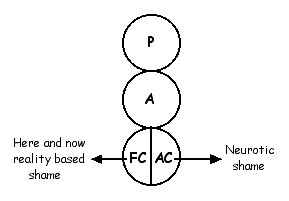
This figure shows the two different types of shame are functions of two different parts of the personality. Reality based shame is a function of the Free Child aspect of the personality and the Adapted Child ego state is where neurotic shame would result from.
This proposal rests on the assumption that shame can be a normal and natural human emotion. An assumption that gets plenty of support. Firstly Freud (1942) notes that shame is “,,, organically predetermined...”(p.46). Then English (1994) discusses the topic in some depth. As she notes it would be impossible to instil shame in a child who did not already have the organic receptors for it. The ability to feel shame can be seen to have some evolutionary advantages as well.
English reports that Charles Darwin suggested that shame had certain evolutionary advantages. Shame is often around nudity and sexual matters and that covering up the genitals afforded more protection of them which also increased the likelihood of the propagation of the species. The expression of shame often involves blushing and a desire to hide which corresponds to the feeling of being dangerously exposed.

Why only cover up those parts of the body?
English, F. (1994) ‘Shame and Social Control Revisited.’ Transactional Analysis Journal. 24, 2, 109 - 120.
Freud, S. (1942) Three Contributions to the Theory of Sex. London: Imago.
As a result humans are so constructed that should a particular set of circumstances arise they will naturally feel shame. To make the assessment of reality based shame versus neurotic shame one needs to judge the appropriateness of the circumstances that have lead to the shame reaction.
Sometimes this is clear but at other times it is harder to assess. As said before shame is often, but by no means always, associated with nudity, sex or intimate physical and psychological factors. Below are some instances where many would feel shame as an appropriate H&N reaction.
The child who wets its bed or soils itself.
A woman discovers her ex-partner has placed intimate nude photographs of her on the internet for all to see.
A man is publicly exposed as an adulterer in his church group.
A man publicly jokes about his wife’s vaginismus.
A woman pokes fun at her husband about his baldness which she knows he is very sensitive about.

If a person reports feeling shame in such situations these could be diagnosed as Free Child shame reactions.
Some times the circumstances are less clear.
A teenager gets an F for his maths test.
A lecturer trips on steps as he walks up onto the stage to give a lecture.
Is it appropriate to feel shame in these examples, is harder to judge.
Many people with a social phobia report shame and embarrassment that is neurotic in nature. They feel as they walk into a social gathering that everybody is looking at them, they look awkward and odd such that they experience shame. Or as they talk they think they are blushing and saying stupid things and feel shame as a result.
These are likely to be Adapted Child ego state responses of shame. One reason why these occur can be due to the parenting styles as described above. If the parents have used shame as a method of punishment and said things like, “You should be ashamed of your self for...” the person is primed to have shame reactions as an adult. As a result they will have reactions of shame when most others would not.

This leaves us at the next juncture of what does one do when they feel shame? Thus the distinction between neurotic and reality based shame assumes some importance.
Graffiti
Very glad you are working on this. Shame is so important I think - part of the social dimension of our existence. And so much psych tends to the individualistic.
ReplyDeleteGUILT
ReplyDeleteJust the other week I was sitting chatting with 2 ladies – it was a lovely cuppa morning. We began to talk about others in an unsavoury way. One of the ladies received a phone call and left. The remaining lady and I were left alone and I began to feel really bad. I have always made a personal pact with myself that I will not down talk anyone in public, with others, especially if the people we were talking about weren’t there, present with us, at the actual gossip session.
I realised what I had done and turned to the remaining lady and told her what we had done. I apologised for my part in the matter and asked her to remind me that I don’t want to gossip, if ever it happened again (and knowing women... it will). She turned to me and asked me to do the same for her.
What did it feel like?
Even while we were sitting there (the 3 of us) I began to get a sinking feeling inside me. It was as though something were over shadowing me and I began to feel guilty – I was being a very bad person. After I spoke with the remaining lady it went away... rather quickly.
SHAME
At around the age of 12 we used to go to a church youth group. We – 4 girls – were picked up every week by a young (maybe 18/19 year old man). My friend’s sister would have been around 15/16 at the time and while my friend and I would sit around outside... they would mess around in the car. Then one night he wanted me to be with him. That was the first time I’d ever been kissed and it was the most terrible thing ever. Luckily enough I didn’t want to do anything else and insisted so.
Even now, my skin crawls at the thought of the ugliness of the whole thing. I feel like meat. I feel ugly. I feel bad and worthless. I don’t understand why I allowed that to happen to me and can’t believe that it did. I can still feel his spit running down into my mouth and I am contaminated beyond help.
I can not allow anything like that to happen... ever again.
ANGRY AT MYSELF
I’m not dead yet! I am a Gut-less wonder!
Thanks Roses, they are good examples and most helpful. If I use them later on I will ask you for permission.
ReplyDeleteI must say I do feel some concern and caring of you my good Aussie friend about your current anger at self. I hope you can kind of resolve it in some way soon. Let me know if you want anything from me
Hugs
Tony
I'm fine thanks Tony. I appologise for thinking it. I was so angry at the time. After writing the guilt bit, i was fine. But then I wrote the shame bit and for some reason the Anger at self bit just ended up being what it is.
ReplyDeleteYou say that for 'some' people, death is an option and I agree with you. I would also like to add to your statement though, that anyone alive and living also has death as an option too.
I do smile now though... what on earth could I want from you? You already give so much. Thank you for that. I really do appreciate you.
Hugs back atcha
Suzi